Along with my Sawyer Mini water filter, my favorite piece of backpacking gear is my dehydrator. No, I don’t lug my dehydrator around with me on the trail. 🙂 However, I do use it to make dehydrated backpacking meals. DIY dehydrated meals not only cut down on backpacking expenses, but also save you a lot of weight.
You can dehydrate practically anything. In addition to the obvious fruits for homemade trail mix, you can also dehydrate things like tomato sauce, cooked veggies, and beans.
I even dehydrate entire meals on my dehydrator. Then I can just add water on the trail to rehydrate them. If you are interested in learning how to make dehydrator backpacking meals, get my ebook. It has over 50 recipes, plus tons of advice on meal planning and nutrition for backpacking. Get the ebook now.
One of my favorite dehydrator backpacking recipes is hummus. It’s fast, easy, and dries very lightweight. How light? It might vary on the hummus recipe you use, but you can expect around 190 calories per ounce!!! That’s way over the 120 calories/oz recommendation for backpacking food.
Backpacking Dehydrator Hummus Instructions
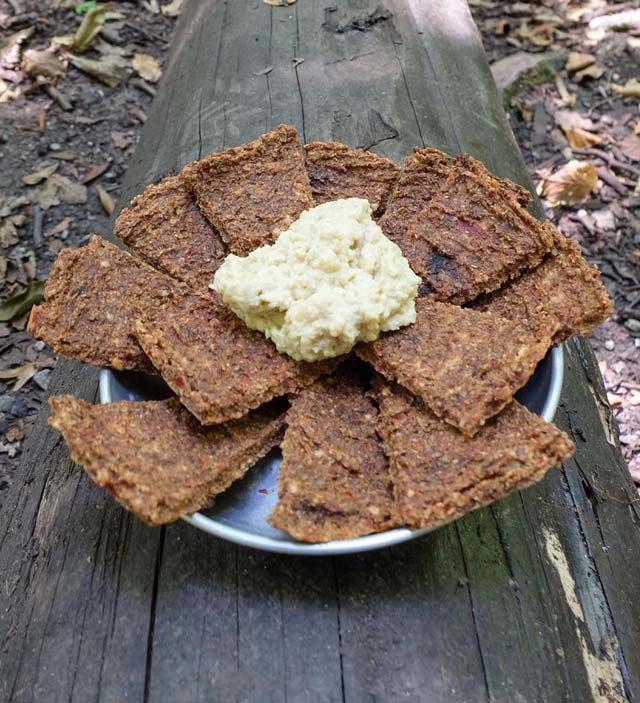
Here’s a gourmet as heck backpacking lunch: homemade red pepper crackers and hummus (all on the dehydrator).
Dehydrated hummus is really simple to make.
Step 1: Make hummus.
Use whatever recipe you like. Or buy readymade hummus.
Avoid hummus recipes which call for a lot of oil or tahini. Too much fat in your hummus will make it go bad faster. You can always bring a little bottle of olive oil with you backpacking and add it to your rehydrated hummus.
Step 2: Prepare your dehydrator sheets
Obviously you can’t just spread hummus on your dehydrator racks. It would fall through the holes. Instead, you’ve got to put a sheet down for it.
You can buy dehydrator sheets like these ones for fairly cheap. They are basically a mesh screen. The purpose is to let the air through without letting the food fall through. You can buy any brand of sheets and just cut them to fit your dehydrator.
Alternatively, you can just use parchment paper. The problem with parchment paper is that it blocks air flow, which means your hummus won’t dry out well. To solve this problem, you can poke a bunch of holes into the parchment paper.
Or, use small circles of parchment paper (as opposed to paper cut to fit your dehydrator trays). This allows for much better air flow.
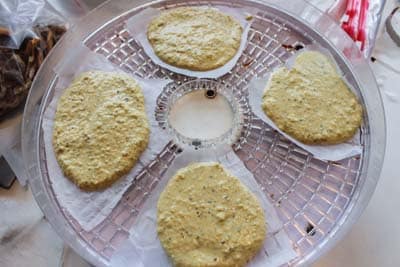
Step 3: Spread hummus on the sheets
I spread it to be about ¼ to ½ inch thick. Try to make the thickness uniform across so they dehydrate evenly.
Step 4: Dehydrate
I’m not too scientific about this. I dehydrate pretty much everything at 104 degrees F (40 degrees C). Hummus usually takes about 12 hours to dehydrate. It helps to rotate the trays at least once. Otherwise the hummus on the bottom will dehydrate first.
You’ll know it is done when the hummus is very dry. It will look a bit like bark. You should be able to break it easily. If you used a lot of oil in the hummus, it might bend more than break.
Step 5: Grind Up (Optional)
This step is optional, but I find it helpful to grind up the dried hummus in my high-speed blender. This creates a hummus powder. The reason for doing this is because the hummus will rehydrate a lot faster and without clumps.
If you skip this step, at least crumble your hummus up as much as possible before you rehydrate.
Rehydrating Your Dried Hummus
Again, this is easy. Just add water to the dried hummus. Let it sit for a few minutes. Stir to get out any clumps.
How to eat on the trail?
- On bagels
- In tortillas
- With couscous
- As pasta sauce
How Long Does Dehydrated Hummus Last?
Dehydrated hummus will usually last at least 4 to 6 weeks if kept at room temperature in a closed zip plastic bag. However, the shelf life can be a lot shorter, especially if the hummus has a lot of oil in it or the temperatures are high.
Oil does not dehydrate. If your dehydrated hummus has a lot of oil, it will be moist. The moisture can cause the hummus to go bad faster. The oil itself can also start to go rancid. It isn’t dangerousto eat rancid oil (it won’t make you sick like spoiled meat or dairy will), but it gets a gross sour taste.
Also remember that dehydrated foods will absorb the taste of whatever they are stored next to. So don’t store your dehydrated hummus right next to your dehydrated bananas unless you like banana hummus!
Other Dehydrator Backpacking Recipes
Below you can see some pictures of dehydrator backpacking meals I’ve made. All of the recipes are available in my eBook. There’s also tons of advice on backpacking meal planning and nutrition.
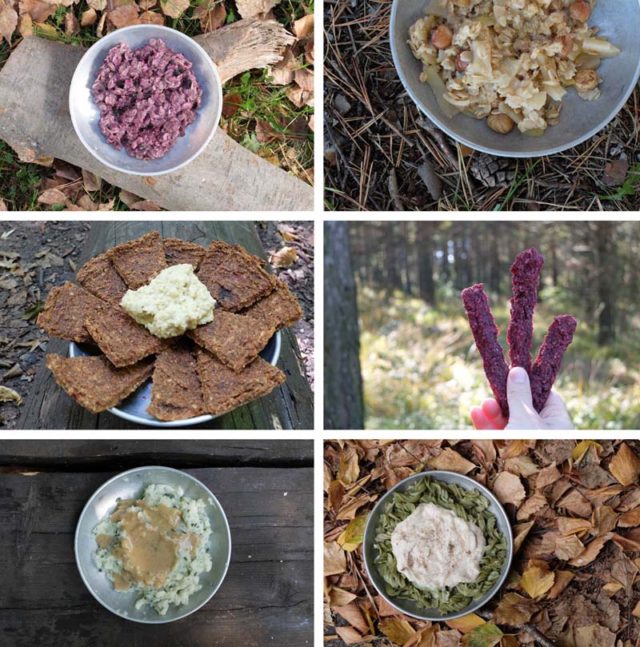
These dehydrator meals pack in over 130 calories per ounce dry weight. Just add water to rehydrate! Get the recipe ebook here at 50% off!


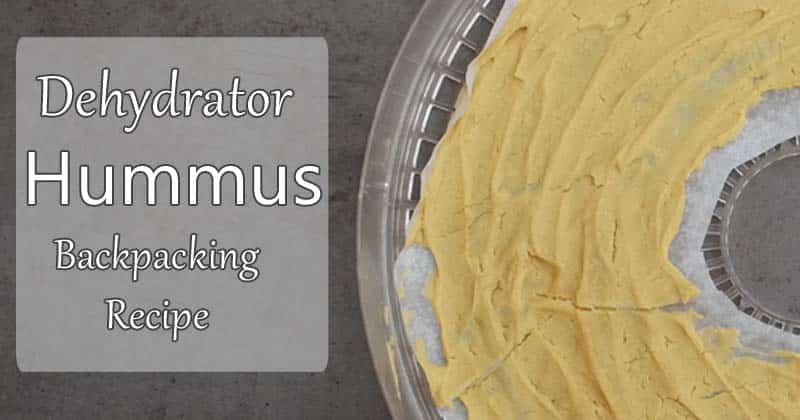


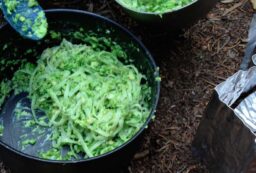
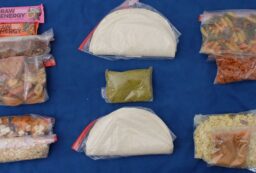
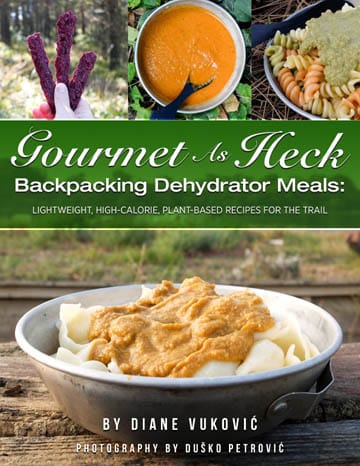






2 Comments
Brian
September 30, 2021 at 5:43 amKind of weird how this write up goes from prepping your dehydrator to spreading the hummus but there is absolutely no recipe for the humus lol. Might help if you also mention that oil or fat doesn’t dehydrate that way people don’t read this and think they can just dehydrate the stuff they bought at the store.
Diane
September 30, 2021 at 12:54 pmYou can dehydrate any hummus recipe or even hummus you bought at the store. The fats don’t dehydrate but, so long as the recipe isn’t 50% oil or something, it actually doesn’t matter. The final product can look a bit oily but will still last a very long time. I’ve even dehydrated coconut milk based chowder that was super fatty and it was okay for over a month in warm weather. After that, it started to get a bit rancid (sour tasting).